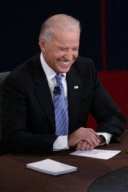When President Barack Obama and Republican nominee Mitt Romney square off in their second debate will body language make the difference?
By most accounts, Gov. Romney won the first round by delivering his key messages forcefully, smiling appropriately, looking directly at the President and using body language to signal that he felt totally in command. He was praised for giving a masterful presentation.
President Obama, on the other hand, was criticized for his lackluster performance. Even he acknowledged, euphemistically, that he had been “too polite.” He looked down at the podium, rarely smiled, fumbled his closing remarks and left the stage immediately after the debate, while a smiling Gov. Romney celebrated on stage with his very happy family and team.
Will Vice President Biden Be His Model?

Will President Obama take his cues from his Vice President, Joe Biden, who many thought won the vice presidential debate last week despite his over-the-top body language?
The Veep continually smiled and laughed as his opponent spoke. He used broad gestures and often interrupted.
This is exactly what we advise clients not to do – to interrupt and use inappropriate language. The Vice President may have energized the Democratic base, but many pundits claimed that Mr. Biden alienated the independent voters whose support each candidate urgently needs to win the election.
There is no doubt, though, that Mr. Biden was his authentic self.
What To Look For
As you’re watching the Presidential debate, you can use this Individual Profile checklist to evaluate each candidate’s performance. Particularly look for:
- Delivery. Is each candidate self-confident and enthusiastic about what he is saying? Is he picking up the subtle cues from the live audience present at the debate to gauge if his message is resonating? Is he irritating the moderator? Does each debater seem friendly and composed? Is each candidate’s overall image “Presidential?”
- Hands. Are the candidates using purposeful hand gestures for emphasis? Is their body language appropriate or a turn-off?
- Eye contact. President Obama rarely made eye contact with Gov. Romney in the last debate. Is he making eye contact this evening? Is it natural or does it seem forced?
- Timing and Organization. In both the first Presidential debate and the Vice Presidential debate the candidates repeatedly ignored their allotted time. Do you feel each candidate is getting his share of time? Is one of them constantly interrupting the other? Do you find this annoying and is it affecting your attitude towards that candidate and potentially changing your vote?
Debates Matter
Presidential debates, like business presentations, matter. Successful presenters can sway people to their point of view. Content matters, but presentation style can be even more important, as President Obama learned.
That was apparent in the first-ever televised Presidential debates between John F. Kennedy and Richard M. Nixon in 1960.
In the first of what came to be called “The Great Debates,” the soon-to-be President Kennedy appeared young and fit. Richard Nixon was recovering from knee injury. He looked thin and sickly and refused to wear makeup to improve his color and lighten his 5 o’clock shadow. He had a sweaty upper lip.
According to an account of the debates by the Museum of Broadcast Communications, “Voters in 1960 did vote with the Great Debates in mind. At election time, more than half of all voters reported that the Great Debates had influenced their opinion; 6% reported that their vote was the result of the debates alone.”
Polls indicate that this race is about even. Do you think the next two Presidential debates will influence the outcome? Could they change how you vote? Please let us know in the comment box below if the debates influence your opinion or help you make up your mind.
Related articles
- 7 Things You May Not Know About U.S. Presidential Debates (history.com)
- Biden Laughs His Way to Victory in Vice Presidential Debate (truthdig.com)
